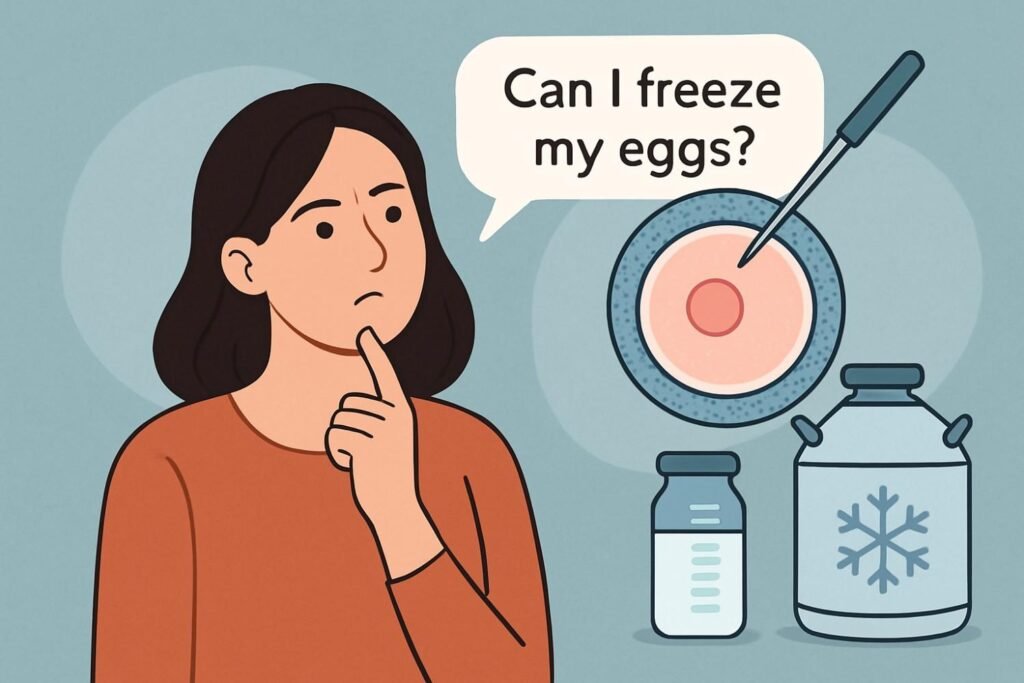Life doesn’t always follow a perfect timeline. Career goals, personal growth, or health concerns can lead many women to delay pregnancy. The good news is that egg freezing is a safe, proven method that allows you to preserve your fertility and plan motherhood on your terms.
At Nex IVF Patna, we help women make informed choices about their reproductive health. This blog explains everything you need to know about egg freezing, who it’s for, how it works, and why more women are considering it today.

What is Egg Freezing?
Egg freezing, medically known as oocyte cryopreservation, is a process in which a woman’s healthy eggs are collected, frozen, and stored for future use. These eggs can be thawed later, fertilized through IVF, and used to achieve pregnancy.
This technology gives women the flexibility to delay pregnancy without compromising their chances of becoming a mother.
Who Should Consider Egg Freezing?
Egg freezing may be a good option if you:
- Are in your 20s or early 30s and not ready to start a family
- Are focusing on your education, career, or personal goals
- Have a medical condition such as cancer requiring treatments like chemotherapy
- Have a family history of early menopause
- Have low AMH levels or declining ovarian reserve
If you’re uncertain about your fertility, a simple AMH test at Nex IVF Patna can provide clarity and guidance.
How Does the Egg Freezing Process Work?
Here’s a step-by-step breakdown of the process at Nex IVF Patna:
1. Fertility Assessment
A series of blood tests and ultrasound scans are conducted to evaluate your ovarian reserve and overall reproductive health.
2. Ovarian Stimulation
Hormonal medications are prescribed for 10 to 12 days to stimulate the ovaries and produce multiple mature eggs.
3. Egg Retrieval
The eggs are collected using a minimally invasive procedure under light sedation. It’s safe, quick, and usually completed within 15–20 minutes.
4. Freezing and Storage
Healthy eggs are frozen using vitrification – a rapid freezing technique that preserves egg quality for years.
How Long Can Eggs Be Stored?
In India, eggs can be legally stored for up to 10 years. Once frozen, the eggs do not age, meaning if you freeze them at age 28 and use them at age 36, they retain the quality of a 28-year-old egg. This greatly increases your chances of a successful pregnancy later in life.
Is Egg Freezing Safe?
Yes, egg freezing is a widely accepted and safe procedure. At Nex IVF Patna, we use internationally approved protocols and cutting-edge technology to ensure the best possible outcomes. The procedure does not affect your future natural fertility and has no long-term health risks.
Why Consider Egg Freezing Now?
- Fertility naturally declines after age 30, and more rapidly after 35
- Egg freezing allows you to preserve your fertility at a younger, healthier stage
- It gives you more control and flexibility in planning your future
- You can focus on your present without worrying about your biological clock
Why Choose Nex IVF Patna for Egg Freezing?
At Nex IVF Patna, we offer:
- Personalized fertility counselling
- Transparent pricing with no hidden charges
- Advanced cryopreservation technology
- Experienced fertility doctors and embryologists
- A compassionate, supportive environment for your journey
Take Charge of Your Future with Nex IVF Patna
Egg freezing is not just about delaying pregnancy. It’s about empowering your future. Whether you’re not ready for motherhood now or are planning ahead, Nex IVF Patna is here to guide you at every step.
Contact Nex IVF Patna today to schedule your consultation and learn more about how egg freezing can help you take control of your reproductive choices.